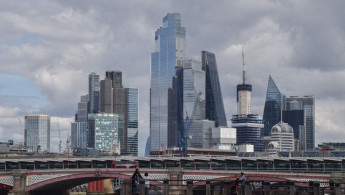Explainer: Are Muslim bank accounts being targeted in the UK?
The CEO of the Cordoba foundation, Anas Altikriti, has had his bank account closed two weeks after it was placed under review by UK bank Barclays.
The bank, which had closed down Altikriti's credit cards prior to the account closure, has failed to issue an explanation as to why the accounts were terminated.
According to Altikriti, three credit cards and two bank accounts were withdrawn, with the decisions coming after Barclays solicitors had told his solicitors that a "substantive" response would be made by the end of this week.
Why do banks close customer accounts?
"Debanking" occurs when a bank closes an account because it is deemed risky. This can occur for a number of reasons, including if the account holder is deemed a "politically-exposed person."
A politically-exposed person is usually someone who has a public function and has a greater risk of susceptibility to corruption or bribery. An estimated 90,000 people in the UK are categorised as politically exposed persons.
One of the most prominent debankings recently was of former UKIP leader and broadcaster Nigel Farage, who had his account with NatWest subsidiary Coutts closed partially on political grounds.
According to internal documentation obtained by Farage, the bank feared alleged "promotion of xenophobic, chauvinistic and racist views."
However, other prominent figures include anti-Brexit campaigner Gina Miller and energy secretary Grant Shapps have also admitted to being victims of debanking.
How does debanking affect Muslim communities in the UK?
Although the issue of debanking is known to affect public office holders, it also is estimated to have affected upwards of 343,000 people in the UK in 2021-22, meaning 1,000 accounts were closed every business day of the week.
Altikriti, who is a Muslim and supporter of the Muslim Brotherhood is one such person among many who have been debanked. He was debanked before in 2014 by HSBC,
Other notable entities to suffer the same treatment include Finsbury Park Mosque, whose bank account was closed by HSBC after it was added to the notorious World Check database, which is owned by Thomson Reuters.
According to a 2019 al-Jazeera investigation the World-Check database holds at least 3 million names, with an estimated 1 million having a suspected "terrorist" affiliation.
Journalist Peter Osborne also found Altikriti to be on this list, with the Pro-Palestinian NGO Palestine Solidarity Campaign also found to be on the list. It was also debanked at that time.
Other entities include charity Islamic Relief and the NGO Friends of Al-Aqsa.
Among those in the UK who are most likely to be debanked are UK Muslims. Currently, 10 percent of UK Muslims do not have a current account, as compared to two percent of all adults in the general UK population.
What's next?
In an open letter to UK Prime Minister Rishi Sunak, the Secretary General of the Muslim Council of Britain (MCB) Zara Mohammed stated that those who have been impacted by debanking "include many high-profile Muslim-led charities and prominent Muslim individuals".
It also called for Sunak to conduct "a complete review of banking practices," noting that the World-Check database, while useful for banks, has prompted concern over how UK Muslims are placed on the database "without validated evidence of any criminal activity."
The calls from Nigel Farage and MCB have added pressure on the government to review the issue of debanking, with Chancellor of the Exchequer Jeremy Hunt calling on the Financial Conduct Authority to "investigate how widespread this practice is, and put a stop to it."
Separately, on Monday the UK's Financial Conduct Authority said it would ask members of parliament, as well as other public officials about the nature of the politically exposed persons regime as part of a review.
In the case of Altikriti, Barclays bank told The New Arab "Whilst we cannot comment on individual accounts, we comply with our legal and regulatory obligations. We would only withdraw banking services from an individual or business in exceptional circumstances."
They also expressed support for "the government’s initiatives to standardise the approach across banks, including non-exclusion on the basis of political or religious views or beliefs."





 Follow the Middle East's top stories in English at The New Arab on Google News
Follow the Middle East's top stories in English at The New Arab on Google News


